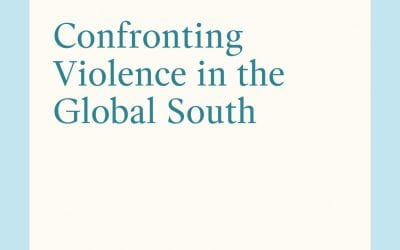Advocating for Animals in South America
It All Began with a Victoria
As young boy growing up in Chile, I remember constantly asking my parents and other adults about the horse-drawn carriages known as Victorias. Why are those carriages allowed? why are those horses subjected to such cruel conditions? why is nobody doing anything about it? These were questions that I would ask the adults around me, and that were never answered with the same conviction that others were answered with.
At some point, these old horse-drawn carriages became an identifying feature of my hometown Viña del Mar, on the central coast of Chile, but I will never forget my early moral discomfort.
To this day, I believe that we adults fail to answer such simple questions to children.
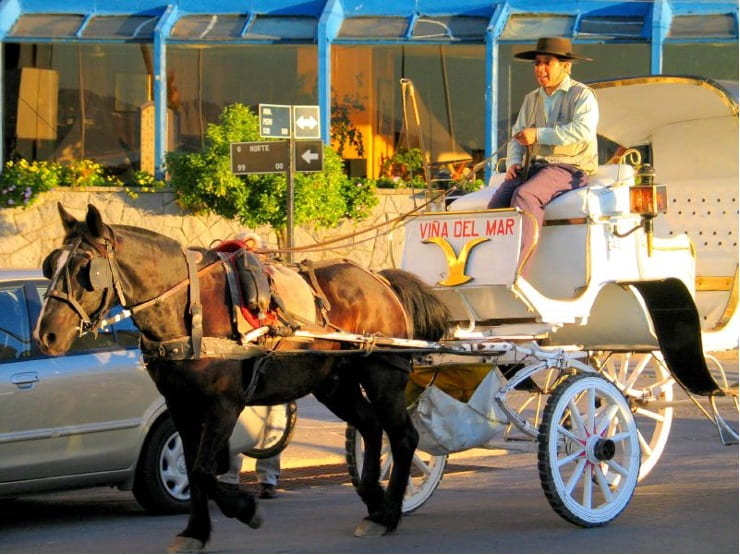
A Victoria passing by the coast of Viña del Mar. Image: Viajar24h.com / Creative Commons
Years later, while I was studying law in the city of Valparaiso, a classmate told me that some students planned to get together after class to discuss some animal readings. He always had a slightly twisted sense of humor; however, when I realized that he was serious, I signed up.
There were five of us and we called ourselves the “Animal Law Study Group,” the first of its kind in that school. There was no more formality than that. We simply met every two or three weeks to discuss the literature we had selected the previous session.
Thus, in 2013 I had in my hands a copy of Australian philosopher Peter Singer’s Animal Liberation, and learned that Eugenio Raúl Zaffaroni, a Supreme Court Justice in Argentina, promoted certain conceptions that conceived animals as persons.
That was mind-blowing for me—enough to the point of redefining my relationships with other animals. But, could a lawyer really dedicate himself to Animal Law? Does that discipline constitute a real field? These were questions I grappled with intermittently for some time, until that sunny summer morning when everything became clearer.
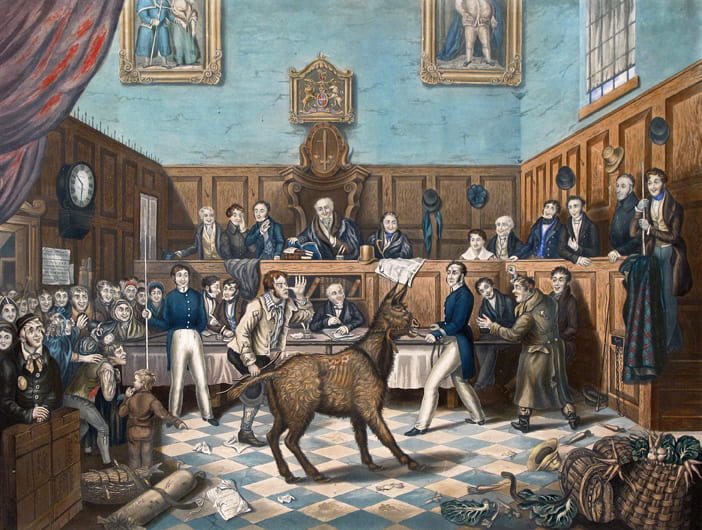
Painting by P. Mathews in or just after August 1838 of the Trial of Bill Burns, the first prosecution under the 1822 Martin’s Act for cruelty to animals, after Burns was found beating his donkey. The prosecution was brought by Richard Martin, MP for Galway, and the case became memorable because he brought the donkey into court. Image: P. Mathews / Creative Commons
It was the year 2014, while walking through the streets of Viña del Mar, I came face to face with a Victoria parked on the side of a quiet street. The horse looked crestfallen, morally defeated and helpless. We were alone. I was the only human in front of him, and probably posed a threat.
I was experiencing the same frustration I had felt as a child at the sight of such individuals, condemned for life to their enslaved fate. The difference was that there was no longer any adult to ask questions of. I was the adult who had to provide the answers. After a few moments I felt I had had enough.
It was precisely at that moment that I knew I wanted to devote my professional practice to the defense of animal interests.
I never imagined at the time that this passion would eventually lead to the defense of Sandai, the only Bornean orangutan deprived of liberty in a South American zoo, kept at Buin Zoo, in the Metropolitan Region of Chile. The action was the first of its kind brought on behalf of a non-human animal in Chile, and sought, among other things, the declaration of Sandai’s status as a non-human person and his subsequent release and transfer to a sanctuary specializing in large primates located in Brazil. While our bid wasn’t totally successful (I’ll tell you more about that later), the process confirmed my early intuition that it was necessary to provide greater technical depth to Animal Law in Chile and to promote the development of legal research in the area, in order to normalize its existence, its teaching and eventual practice.
During 2015 I approached some organizations to propose the development of this kind of work, but the idea was considered to be ambitious. However, those rejections would end up being the germ of CEDA Chile, an organization that would come to life a few years later.
After a couple of years of studying some Animal Law writings, I decided that I was ready to take my passion a step further. Therefore, during 2018, I started preparing myself to apply for the Animal Law LLM taught by Lewis & Clark University, determined to become the first Chilean to obtain such degree.
I arrived in Portland, Oregon, in July 2019, and immediately connected with the energy of that charming city. It was a very rewarding period, in which I had the opportunity to meet amazing people. But one of the most relevant inputs I got from that experience was the realization that animal advocacy was possible. That its limits depended only on us.
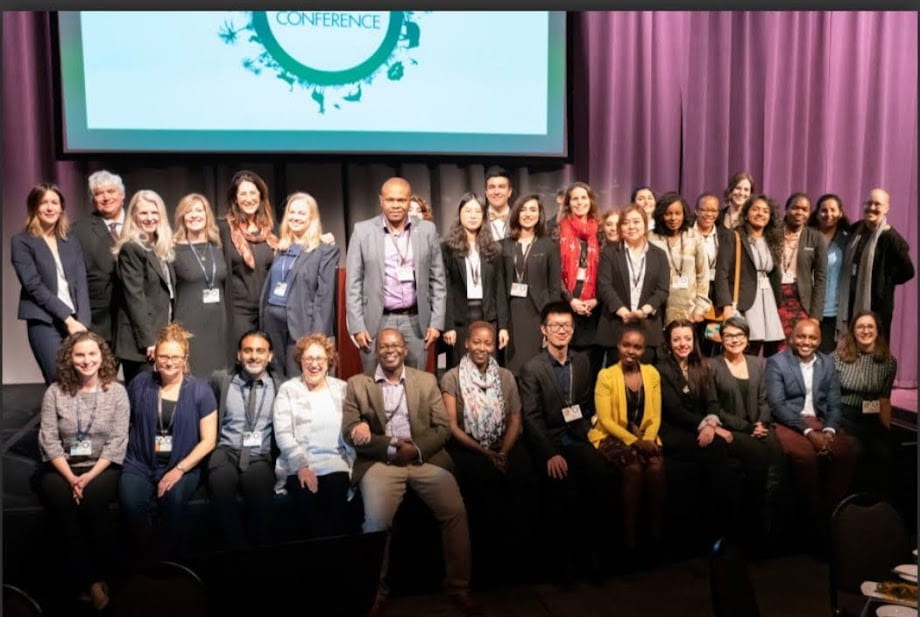
Animal Law LL.M. students, alumni and staff at the 2019 Animal Law Conference, Portland, Oregon. Image: CALS – Lewis & Clark Law School.
During that very first semester I decided to carry out some legal research on the Victorias. After a few weeks I had done research that not only described exhaustively the legal framework that regulated this activity, but also contained information that uncovered a series of mistreatments and irregularities. I wondered how I could use that information in favor of those horses. I was determined to generate as much impact as possible.
It was November 2019, and there were only a few weeks left for the International Song Festival of Viña del Mar, probably the most important event organized by the city. It was usual that some civil movements were intensified during the days prior to the event, since such international exposure tended to favor a quick response of the authorities to ongoing demands.
I had enough time to do something about it. Why not promote such legal findings through a center of studies specialized in Animal Law? That was how on November 18, 2019, I founded the Center for Animal Law Studies CEDA Chile, aimed at promoting the development of Animal Law, for the sake of expanding the frontiers of moral consideration that exclude non-human animals.
The plan was a success. The research and its findings were promoted through social networks from CEDA and I even sent the background information to the Comptroller of the Republic, a state administration supervisory body that had already summoned the municipality some time ago to improve deficient supervision of the Victoria carriages.
Within the first week of promotion, a great citizen discontent began to revive and the Comptroller’s Office demanded a response from the municipality. Besides, the movement “A Victoria for Viña” (Una Victoria para Viña), which had arisen some years ago, requested meetings with the city’s mayor to reach a definitive solution. When people from this movement approached me asking if they could use some passages of the paper in the meeting with the Municipality, I immediately suggested that they present the report in its entirety, which they finally did.
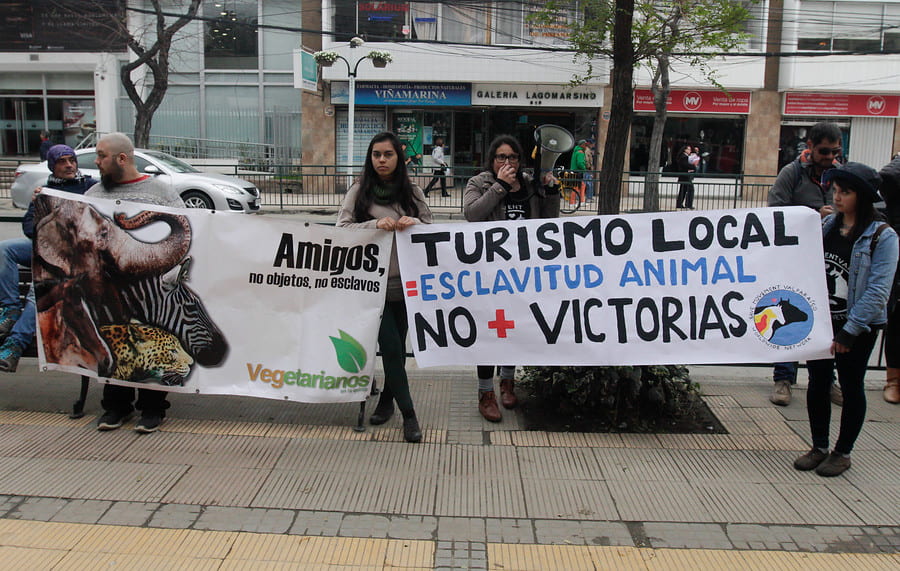
“Local Tourism = Animal Slavery. No + Victorias”: Demonstrators protest in front of the Municipality of Viña del Mar requesting a ban on Victorias, February 2020. Image: Adnradio.cl
After that meeting, the municipality took a historic step and annulled the ordinance that allowed the Victorias to circulate. Thus, after almost a century of existence, it banned them at the beginning of 2020.
However, the last horses that were used in this activity are still the subject of dispute between coachmen, animal rights activists and the Municipality. Unfortunately, due to a lack of agreement, these individuals are still at the disposal of their former owners, and it has not been possible to give them the dignified life they always deserved.
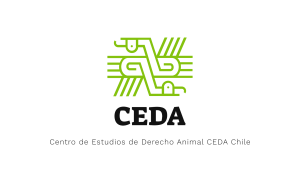
Logo of the Center for Animal Law Studies CEDA Chile. Image: CEDA Chile
Furthermore, we have issued expert opinions on legislative processes, and we have made available to the public the most relevant animal news and problems in Chile and abroad.
In addition, we have coordinated various academic activities aimed at addressing animal issues. Thus, we coordinated the first seminar on Chilean Animal Law at the prestigious Universidad Católica de Chile and have taught modules to law students in other schools. We have also given dozens of free webinars, in which we have had world-class guests.
In 2021 we created the area of intersectional literature, also known as CEDA-ALI, in order to address animal issues through a literary, non-legal point of view. This allowed us to inaugurate the Dossier of Animal Studies, a collective work to be published annually, seeking to address animal both through legal research and literary works, such as essays, literary criticism and poems. We find this exciting, as it allows us to make these issues visible through less conventional formats.
Thus, in a self-managed manner and under a strict “do it yourself” ethic, the first 50 copies of the Dossier were sent to the printer in January 2023, to be free of charge distributed in several law schools. Likewise, during the following months we will launch its open-access digital version.

Front and back cover of the book Dossier of Animal Studies N°1. “A legal and literary reflection on the animal question” Image: CEDA Chile
I thought we could do even more for animals. Why not coordinate some kind of animal activism? What about strategic animal litigation in Chile, at the time non-existent? Was CEDA the proper platform to carry out such work? After some consideration, I decided not to carry out such activities through CEDA, as I feared that they might affect the CEDA’s respectable research reputation.
Thus, during the year 2021 I founded the Fundación Justicia Interespecie (FJI)—or Interspecies Justice Foundation—, an organization oriented to create cultural conditions that allow the transition towards intersectional and interspecies justice. In this organization I held the position of president until the beginning of 2023, and assumed the role of director of the Strategic Litigation area.

Logo of the “Interspecies Justice Foundation” Image: Fundación Justicia Interespecie
Perhaps the most emblematic work we developed during the first two years of FJI was the habeas corpus filed on behalf of Sandai, the only Bornean orangutan deprived of liberty in a South American zoo, kept at Buin Zoo, in the Metropolitan Region of Chile. The action was the first of its kind brought on behalf of a non-human animal in Chile, and sought, among other things, the declaration of Sandai’s status as a non-human person and his subsequent release and transfer to a sanctuary specializing in large primates located in Brazil.
The case caused a great media impact in Chile, and was covered by several renowned media such as CNN and some television stations. It was also reported in some international media, in the United States, Europe and Asia. Unfortunately, the petition was declared inadmissible by the Court of Appeals of San Miguel, a decision that was confirmed by the Supreme Court of Chile.
Despite the above, the highest court issued an unusual decision that has already been the subject of academic study, in that although it declared that Sandai was not a person, it considered that Sandai was indeed “deprived of his liberty,” ordering the adoption of various measures to ensure his interests were not affected.
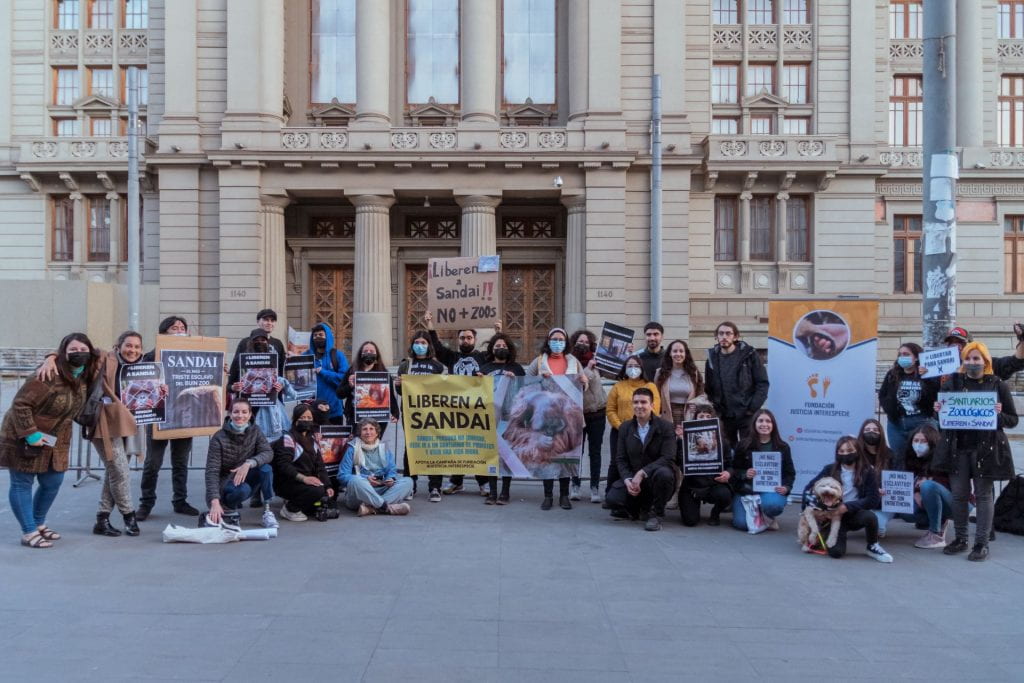
Symbolic act held outside the Supreme Court of Chile, during the filing of the habeas corpus petition on behalf of Sandai. Image: Lorna Remmele
FJI has also developed a solid promotion of academic activities, which differ from those provided by CEDA Chile, in terms of content and audience. Thus, FJI has developed dozens of activities aimed at educating the public about veganism, activism and animal rights, in schools, parent, student and neighborhood centers. Moreover, FJI regularly participates in vegan fairs, activist meetings, and has even co-organized feminist events.
FJI also taught a course on Animal Rights and Veganism at the Universidad Abierta de Recoleta, the first free and municipal university created in Chile. The course was a success, and FJI is currently in talks in order to offer the course again in 2023.
Likewise, we cannot fail to mention its legal and legislative area which has begun to work on the design of animal bills. In addition, during the year 2023, FJI will inaugurate the first animal publishing house in Chile, in order to promote written works dealing with animal issues.
However, sometimes our enthusiasm goes faster than our material and human possibilities, which is a problem faced by many organizations within the movement.
In this regard, I think it is crucial to professionalize the function we develop, in order to deliver the best from a technical and human point of view. However, this requires not only hard work, but also material means and funding, which most of the time is very difficult to obtain.
Thus, at the beginning of 2023 I took on the challenge of directing FJI’s fundraising area, with the intention of helping my colleagues to carry out all the projects they have proposed for the organization. We are on a quest for allies who want to be an active part of the change, a change that has already begun.

Funding. The key challenge faced by most organizations in the field. Image: Mikhail Nilov / Creative Commons
We currently have many projects on our horizon, which will probably be favored by the circumstances of our time. Cultural values change, society evolves, and the frontiers of moral consideration, sooner rather than later, will be extended to include every individual who has been excluded on the basis of anthropocentric cultural constructions.
How far will we go? As far as our imagination will allow. That’s why we will never stop dreaming.
ABOGANDO POR LOS ANIMALES EN SUDAMÉRICA
TODO COMENZÓ CON UNA VICTORIA
Por Diego F. Plaza Casanova
Cuando era niño y crecía en Chile, recuerdo haber preguntado constantemente a mis padres y a otros adultos sobre los carruajes tirados por caballos conocidos como Victorias. ¿Por qué se permiten esos carruajes? ¿Por qué se somete a esos caballos a condiciones tan crueles? ¿Por qué nadie hace nada al respecto? Eran preguntas que hacía a los adultos que me rodeaban y que nunca eran respondidas con la misma convicción con la que se respondían otras.
En algún momento, estos viejos carruajes tirados por caballos se convirtieron en un rasgo identitario de mi ciudad natal, Viña del Mar, en la costa central de Chile, pero nunca olvidaré mi temprana incomodidad moral.
Hasta el día de hoy, creo que los adultos no logramos responder a los niños preguntas tan sencillas como aquellas.

Una Victoria transitando por la costa de Viña del Mar Imagen: Viajar24h.com / Creative Commons
Años más tarde, mientras estudiaba Derecho en la ciudad de Valparaíso, un compañero me indicó que algunos alumnos planeaban reunirse después de clases para comentar algunas lecturas animales. Él siempre tuvo un sentido del humor algo retorcido, sin embargo, cuando super que hablaba en serio, me apunté.
Éramos cinco personas y nos autodenominábamos como el “Grupo de Estudio de Derecho Animal”, el primero en aquella Escuela. No había mayor formalidad. Simplemente nos reuníamos cada dos o tres semanas para comentar la literatura que habíamos seleccionado la sesión anterior.
Así, en 2013 tuve en mis manos un ejemplar de Liberación animal, del filósofo australiano Peter Singer, y me enteré de que Eugenio Raúl Zaffaroni, juez de la Corte Suprema de Argentina, promovía ciertas concepciones que concebían a los animales como personas.
Eso fue alucinante para mí, hasta el punto de redefinir mis relaciones con otros animales. Pero, ¿podía un abogado dedicarse realmente al Derecho Animal? ¿Constituye esa disciplina un campo real? Fueron preguntas con las que lidié intermitentemente durante algún tiempo, hasta aquella soleada mañana de verano en la que todo aclaró.

Cuadro pintado por P. Mathews cerca de agosto de 1838 sobre el proceso de Bill Burns, el primer enjuiciamiento en virtud de la Martin’s Act de 1822, después de que fuera descubierto golpeando a su burro. La acusación fue presentada por Richard Martin, parlamentario por Galway,y el caso se hizo famoso porque llevó al burro al Tribunal. Imagen: P. Mathews / Creative Commons
Era el año 2014, y caminaba por las calles de Viña del Mar, cuando me encontré de frente con una Victoria detenida al costado de una calle poco concurrida. El caballo se veía cabizbajo, impotente y desamparado. Estábamos solos. Yo era el único humano frente a él, y probablemente representaba una amenaza.
Experimentaba la misma frustración que había sentido de niño al ver a aquellos individuos, condenados de por vida a la esclavitud. La diferencia es que ya no había ningún adulto a quien formular preguntas. Yo era el adulto que debía ofrecer las respuestas. Al cabo de unos instantes sentí que ya había tenido suficiente.
Fue precisamente en aquel momento que supe que quería dedicar mi ejercicio profesional la defensa de los intereses animales.
Nunca imaginé entonces que esta pasión acabaría desembocando en la defensa de Sandai, el único orangután de Borneo privado de libertad en un zoológico sudamericano, recluido en el Buin Zoo, en la Región Metropolitana de Chile. La acción fue la primera de este tipo interpuesta en nombre de un animal no humano en Chile, y buscaba, entre otras cosas, la declaración de la condición de persona no humana de Sandai y su posterior liberación y traslado a un santuario especializado en grandes primates ubicado en Brasil. Si bien nuestra postulación no fue del todo exitosa (más adelante les contaré más al respecto), el proceso confirmó mi temprana intuición de que era necesario dotar de mayor profundidad técnica al Derecho Animal en Chile y promover el desarrollo de la investigación jurídica en el área, a fin de normalizar su existencia, su enseñanza y eventual práctica.
Durante el año 2015 propuse la idea a algunas organizaciones, sin embargo, ésta fue calificada de ambiciosa. Pero no todos los rechazos son malos, puesto que aquel episodio terminaría siendo el germen de CEDA Chile, instancia que vería la luz algunos años después.
Luego de un par de años de estudio de obras de Derecho Animal, decidí que estaba listo para llevar mi pasión un paso más allá. Así, durante el año 2018 comencé mi preparación para postular al Animal Law LLM impartido por Lewis & Clark, decidido a convertirme en el primer chileno en obtener dicho grado.
Llegué a Portland (Oregón) en julio de 2019 e inmediatamente conecté con la energía de aquella encantadora ciudad. Fue un periodo muy gratificante, en el que tuve la oportunidad de conocer a gente increíble. Pero una de las contribuciones más relevantes que obtuve de esa experiencia fue el darme cuenta de que la abogacía animal era posible. Que sus límites sólo dependían de nosotros, o en otras palabras, de cuán lejos estábamos dispuestos a llegar.

Alumnos, alumni y staff del Animal Law LL.M. de Lewis & Clark Law School en la Animal Law Conference del año 2019, Portland, Oregon. Imagen: CALS – Lewis & Clark Law School.
Durante el primer semestre de estudio decidí realizar una investigación acerca de las Victorias, así como del maltrato animal que éstas envolvían. Al cabo de algunas semanas tenía en mis manos una investigación que no solo describía exhaustivamente el marco jurídico que regulaba dicha actividad, sino que además contenía información que dejaba en descubierto una serie de maltratos e irregularidades. Me preguntaba cómo podría utilizar dicha información en favor de aquellos caballos. Estaba decidido a generar el mayor impacto posible.
Era noviembre de 2019, y solo faltaban algunas semanas para “El Festival Internacional de la Canción de Viña del Mar”, probablemente el evento más importante organizado por la ciudad. Era usual que algunos movimientos ciudadanos se intensificaran durante los días previos al evento, ya que la exposición internacional favorecía una rápida respuesta de las autoridades.
Tenía tiempo suficiente para hacer algo al respecto. ¿Por qué no promover dichos hallazgos a través de un centro de estudios especializados en Derecho Animal? Fue así como el 18 de noviembre de 2019 fundé el Centro de Estudios de Derecho Animal CEDA Chile, orientado a promover el desarrollo del Derecho Animal en aras de expandir las fronteras de consideración moral que excluyen a los demás animales.
El plan fue un éxito. La investigación y sus hallazgos fueron promovidos a través de las redes sociales de CEDA, y fueron enviados a la Contraloría de la República, órgano fiscalizador de la administración del Estado que en el pasado ya había exigido al Municipio el mejorar la deficiente fiscalización de la actividad.
Antes de cumplirse la primera semana de promoción, comenzó a reavivarse una gran disconformidad ciudadana, y la Contraloría emplazó al Municipio a dar respuestas. Además, desde el movimiento “Una Victoria Para Viña”, el cual se había originado algunos años atrás, solicitaron reuniones el Municipio para alcanzar una solución definitiva. Cuando la gente de este movimiento se me acercó para preguntarme si podían utilizar algunos pasajes del documento en la reunión con el Municipio, inmediatamente les sugerí que presentaran el informe en su totalidad, lo que finalmente hicieron.

Manifestantes protestan frente al Municipio de Viña del Mar solicitando la prohibición de las Victorias, febrero de 2020. Imagen: Adnradio.cl
Tras esa reunión, el municipio dio un paso histórico y anuló la ordenanza que permitía circular a las Victorias. Así, luego de casi un siglo de existencia, las prohibió a principios de 2020.
Como sea, los últimos caballos que fueron utilizados en dicha actividad aún son objeto de disputa entre cocheros, activistas por los derechos animales y el Municipio. Lamentablemente, debido a una falta de acuerdo, estos individuos siguen a disposición de sus antiguos dueños, y no se les ha podido dar la vida digna que siempre merecieron.

Logo del Centro de Estudios de Derecho Animal CEDA Chile Imagen: CEDA Chile
Además, hemos emitido opiniones de expertos sobre procesos legislativos, y hemos puesto a disposición del público las noticias y problemas más relevantes de los animales en Chile y en el extranjero.
A su vez, hemos coordinado diversas actividades académicas destinadas a abordar la problemática animal. Así, coordinamos el primer seminario de Derecho Animal chileno en la prestigiosa Universidad Católica de Chile y hemos impartido módulos a estudiantes de Derecho de otras facultades. También hemos dictado decenas de webinars gratuitos, en los que hemos contado con invitados de talla mundial.
En 2021 creamos el área de literatura interseccional, también conocida como CEDA-ALI, con el fin de abordar la problemática animal desde un punto de vista literario, no jurídico. Esto nos permitió inaugurar el Dossier de Estudios Animales, una obra colectiva que se publicará anualmente y que busca abordar la problemática animal tanto a través de la investigación jurídica como de obras literarias, como ensayos, crítica literaria y poemas. Esto nos parece apasionante, ya que nos permite dar visibilidad a estas cuestiones a través de formatos menos convencionales.
Así, de manera autogestionada y bajo una estricta ética del “hazlo tú mismo”, los primeros 50 ejemplares del Dossier fueron enviados a imprenta durante enero de 2023, los que serán distribuidos gratuitamente en diversas Escuelas de Derecho. Asimismo, durante los próximos meses lanzaremos su versión digital de libre acceso.

Portada y contraportada del Dossier de Estudios Animales N°1 “Una reflexión jurídica y literaria en torno a la cuestión animal” Imagen: CEDA Chile
Pese a lo anterior, pensaba que podíamos hacer aún más por los animales. ¿Por qué no coordinar algún tipo de activismo animal? ¿Qué pasaba con el litigio estratégico animal en Chile, por aquel entonces inexistente? ¿Era la CEDA la plataforma adecuada para llevar a cabo esa labor? Después de pensarlo, decidí no llevar a cabo tales actividades a través de la CEDA, pues temía que pudieran afectar a su respetable reputación como centro de investigación.
Así, durante el año 2021 fundé en Chile la Fundación Justicia Interespecie (FJI), una organización orientada a crear condiciones culturales que permitan transitar hacia una justicia interseccional e interespecie. En esta organización ocupé el cargo de presidente hasta principios de 2023, y asumí el papel de director del área de Litigio Estratégico.

Logo de la Fundación Justicia Interespecie Imagen: Fundación Justicia Interespecie
Quizás el trabajo más emblemático que desarrollamos durante los primeros dos años de FJI fue el habeas corpus interpuesto en favor de Sandai, el único orangután de borneo privado de libertad en un zoológico sudamericano, mantenido en el Buin Zoo, la Región Metropolitana de Chile. La acción fue la primera en su clase interpuesta en favor de un animal en Chile, y persiguió, entre otras cosas, la declaración de la calidad de persona no humana de Sandai y su posterior liberación y traslado hacia un santuario especializado en grandes primates ubicado en Brasil.
El caso causó un importante impacto mediático en Chile, siendo cubierto por diversos medios consagrados como CNN, y algunas estaciones de televisión. Además, logró ser difundido en algunos medios de prensa internacionales, en USA, Europa y Asia. Lamentablemente, el recurso fue declarado inadmisible por la Corte de Apelaciones, decisión que fue confirmada por la Corte Suprema.
Pese a lo anterior, el máximo Tribunal evacuó una inusual decisión que ya ha sido objeto de estudio en la academia, en cuanto si bien declaró que Sandai no era una persona, consideró que sí estaba privado de libertad, ordenando que se adoptaran diversas medidas a objeto de velar por la no afectación de sus intereses.

Acto simbólico con ocasión de la interposición del habeas corpus en favor de Sandai, en las afueras de la Corte Suprema de Chile. Imagen: Lorna Remmele
FJI ha desarrollado una sólida promoción de actividades académicas, las cuales se diferencian de aquellas impartidas por CEDA Chile, en cuanto a su contenido y público. Así, FJI ha desarrollado decenas de actividades tendientes a educar al público sobre veganismo, activismo y derechos animales, tanto en colegios, centros de apoderados, de alumnos y vecinales. Además, FJI participa regularmente en ferias veganas, en encuentros de activistas, y ha coorganizado actividades feministas.
Aún más, durante el año 2022, FJI impartió el curso de Derechos Animales y Veganismo en la Universidad Abierta de Recoleta, la primera universidad gratuita y municipal creada en Chile. Dicho curso fue un éxito y actualmente estamos en conversaciones a objeto de volver a impartir dicho curso durante el año 2023.
Asimismo, no podemos dejar de mencionar su área Jurídica y Legislativa, que desde comienzos de 2023 ha comenzado a trabajar en el diseño de proyectos de ley animales. Aún más, durante el año 2023 la FJI inaugurará la primera editorial animal de Chile, a objeto de visibilizar obras escritas de diversa naturaleza que aborden temáticas animales.
Sin embargo, a veces nuestro entusiasmo es más grande que nuestras posibilidades materiales, lo cual es un desafío al que se enfrentan muchas organizaciones del medio.
Al respecto, pienso que es imprescindible profesionalizar la función que desarrollamos, a objeto de poner a disposición de la causa lo mejor de nosotros, desde un punto de vista técnico y humano. Con todo, para ello no sólo se requiere trabajo duro, sino además medios materiales y financiamiento, el que la mayoría de las veces es difícil de conseguir.
En razón de lo anterior, es que a comienzo del año 2023 asumí el desafío de dirigir el área de fundraising de FJI, con la intención de ayudar a mis compañeros a concretar todos los proyectos que han propuesto para la organización. Así, estamos en búsqueda de aliados que quieran ser parte activa del cambio, un cambio que ya comenzó.

Financiamiento. El desafío clave al que se ven enfrentadas gran parte de las organizaciones del área. Imagen: Mikhail Nilov / Creative Commons
Actualmente tenemos muchos proyectos en nuestro horizonte, los cuales probablemente se verán favorecidos por las circunstancias propias de nuestra época. Las valoraciones culturales cambian, la sociedad evoluciona, y las fronteras de consideración moral, más temprano que tarde, se extenderán para incluir a todo individuo que ha sido excluido sobre la base de construcciones culturales antropocéntricas.
¿Hasta dónde llegaremos? Hasta donde nuestra imaginación nos permita. Por eso nunca dejaremos de soñar.
Diego F. Plaza Casanova is a lawyer, researcher and animal activist originally from Viña del Mar, Chile. He studied law at the Pontificia Universidad Católica de Valparaíso and obtained his degree in Environment and Sustainable Development from the Pontificia Universidad Católica de Chile. He also obtained his LL.M in Animal Law from Lewis & Clark (’20), where he was distinguished with the Cornelius Honor Society. He is founder and director of the Center for Animal Law Studies CEDA Chile, and is founder and president of the Fundación Justicia Interespecie (or Interspecies Justice Foundation, in English). Contact: diego.cedachile@gmail.com
Diego F. Plaza Casanova es un abogado, investigador y activista animal originario de Viña del Mar, Chile. Estudió leyes en la Pontificia Universidad Católica de Valparaíso y obtuvo su grado en Medio Ambiente y Desarrollo Sustentable de la Pontificia Universidad Católica de Chile. Además, obtuvo su LL.M en Derecho Animal de Lewis & Clark (20’), en donde fue distinguido con la Cornelius Honor Society. Es fundador y director del Centro de Estudios de Derecho Animal CEDA Chile, y es fundador y presidente de la Fundación Justicia Interespecie. Contacto: diego.cedachile@gmail.com
Related Articles
Editor’s Letter – Animals
Editor's LetterANIMALS! From the rainforests of Brazil to the crowded streets of Mexico City, animals are integral to life in Latin America and the Caribbean. During the height of the Covid-19 pandemic lockdowns, people throughout the region turned to pets for...
Where the Wild Things Aren’t Species Loss and Capitalisms in Latin America Since 1800
Five mass extinction events and several smaller crises have taken place throughout the 600 million years that complex life has existed on earth.
A Review of Memory Art in the Contemporary World: Confronting Violence in the Global South by Andreas Huyssen
I live in a country where the past is part of the present. Not only because films such as “Argentina 1985,” now nominated for an Oscar for best foreign film, recall the trial of the military juntas…


